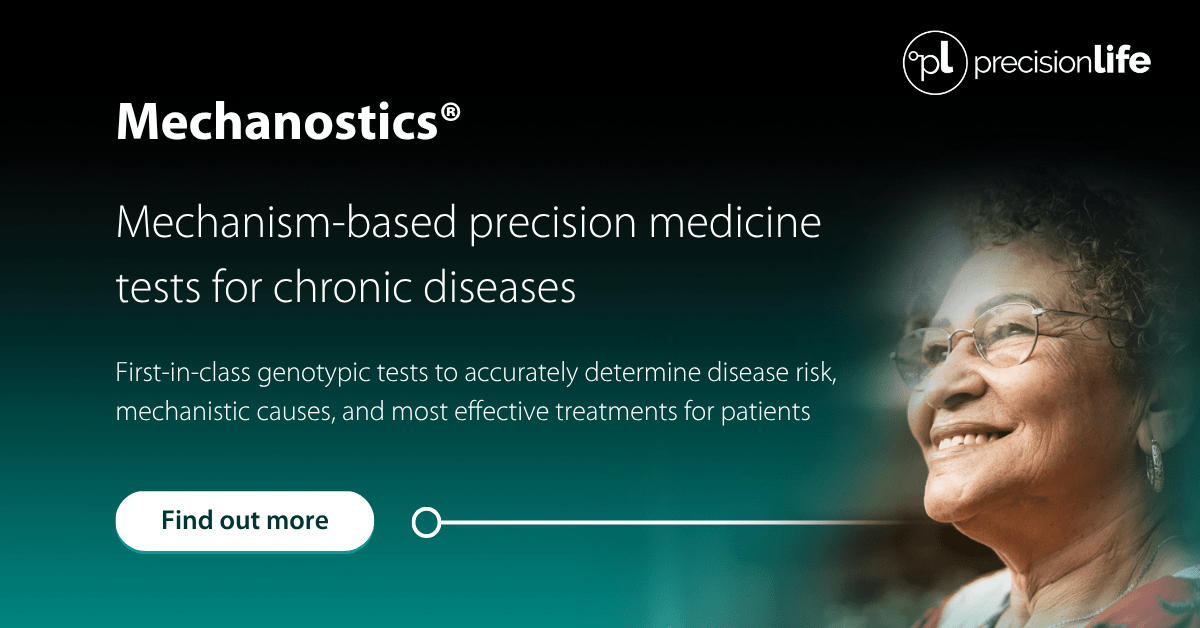Fit for the Future: How Mechanism-Based Precision Medicine Can Transform the Future of the NHS and Healthcare Globally
By Steve Gardner, PhD
CEO PrecisionLife, Expert in Residence at Oxford University, and Chair of the UK BioIndustry Association’s Data, AI and Genomics Advisory Committee
The UK’s NHS is facing the greatest challenge in its 75-year history. Years of growing demand and rising costs brought on by the pressures of a global pandemic, an aging population, and the increasing prevalence of complex, chronic conditions have stretched the system to a critical point.
Fortunately, this is also a time where we have the greatest opportunity to make healthcare better – using new technologies to reinvent clinical care to give better outcomes for patients, more manageable workloads for clinicians, and more efficient and affordable healthcare systems built to last.
In its Fit for the Future Health Plan, the UK Government has taken a bold stance – calling time on incremental evolution and setting a new direction focused on prevention, digital transformation, and personalized care. This vision, rooted in universal access and backed by scientific and clinical innovation, anticipates a new class of genomics, AI, and diagnostic technologies that can meet its ambition at scale.
This changes the trajectory of healthcare entirely – providing the vital bridge between aspiration and implementation. Understanding which mechanisms underpin a patient’s disease to identify risks earlier and prevent their progression.
At PrecisionLife, we believe that mechanism-based precision medicine tools – which we call mechanostics® – can provide the vital bridge between aspiration and implementation. Understanding which mechanisms underpin a patient’s disease has transformed cancer care with a raft of effective precisely and personally targeted drugs, but this has not been possible until recently with more complex diseases.
Mechanostics are new genotyping tests that embody uniquely detailed knowledge about the risks and protective effects associated with a complex disease. By identifying individual patient’s disease risks and the specific mechanisms underlying them, our mechanostics platform makes it possible to identify disease risk earlier, prevent or slow their progression, and choose which drug will work best to intervene more precisely than ever before.
And while these tools are ideally suited to help transform the UK’s NHS, the opportunity – and the need – is far greater. Our ambition is to help healthcare systems around the world to reduce the burden of chronic disease, deliver more cost-effective care, and improve outcomes for billions of people.
Moving from Treating to Preventing Illness
Today, 80% of healthcare spending globally is consumed by chronic diseases – from autoimmune and metabolic disorders to neuropsychiatric and respiratory conditions. These affect billions of patients, but most are still poorly understood, lacking in accurate early diagnostic tools, and difficult to treat effectively. Too often, they are only recognized once severe damage is already done, and the patient may live with the consequences for decades.
The NHS Plan rightly prioritizes shifting from sickness to prevention, embracing predictive tools to spot disease before it takes hold. This recognizes that the best (and cheapest) way to manage the health of a patient is for them not to get ill in the first place.
The goal is not to simply treat illness earlier. It’s to change its trajectory entirely.
This is exactly the role mechanostics are designed to play. Mechanostic tests identify combinations of biological factors that define a person’s risk of developing a complex disease and – crucially – the mechanisms driving it. They provide a detailed view of what’s happening biologically in each patient, enabling earlier, more effective triage and guiding targeted interventions before costs and symptoms escalate.
Reducing Health Inequity
The NHS Plan also calls for a fundamental shift in how care is accessed and delivered. It proposes a system where patients are empowered by data, supported by intelligent digital tools, and no longer forced through hospital corridors to access diagnostics or specialist care.
Mechanostic tests are built for this future.
These tests are non-invasive, low-cost, and can be delivered via simple cheek swabs collected at home or in primary care in the same way as people tested for COVID-19 around the world during the pandemic. They require no specialist storage, no whole genome sequencing and can be operated by patients themselves – making them affordable, scalable and equitable across diverse populations.
This matters. Health inequality is driven by the lack of access to high quality and timely clinical care in underserved communities. By using combinatorial genetic risk factors that are reproducible across ancestries and populations in tests that can be delivered at home, mechanostics offer a practical path toward closing diagnostic gaps and levelling up the delivery of care – not just in the UK, but globally.
Delivering Sustainable, AI-Enabled Healthcare
The NHS Plan makes another critical commitment – transforming the NHS into the world’s most AI-enabled health system, fueled by data and focused on outcomes. But AI without high-quality, mechanistic insights into disease biology will always struggle to deliver true personalized precision for the most common, costly, and complex diseases.
Mechanostics change that by taking the most detailed knowledge of risk and protective features in complex diseases and making them clinically actionable.
These new tests generate highly specific results for patients that can feed clinical decision support tools, optimize therapy selection, and accelerate the development of targeted therapeutics. They are already being used to guide clinical trials, support diagnosis, accelerate the triage and referral of patients, and match individuals to the most appropriate therapies – not just based on symptoms, but on biology.
This approach supports the move toward value-based care models – where funding follows outcomes, and providers are rewarded for improving health, not just treating illness. It aligns with the global trend toward sustainable health systems that can better withstand the growing cost and complexity of chronic diseases.
A Global Opportunity to Pioneer Mechanism-Based Medicine
As the UK positions itself at the forefront of genomics, data science, and AI-driven healthcare, there’s a unique opportunity to lead a new era of medicine: one that moves beyond statistical correlations and toward biological causality.
At PrecisionLife, we’re proud to contribute to this transformation. We’ve shown how this approach works in over 60 complex chronic diseases including long COVID, ME/CFS, endometriosis, autoimmune conditions, ALS and type-II diabetes complications – with multiple clinical studies running.
In parts of the world where whole genome sequences are part of the care record, such as in the Middle East, mechanostics can return precision insights in minutes without the cost and delay of collecting a sample and genotyping it.
The Fit for the Future Plan recognizes that the UK NHS cannot continue to rely on a reactive model of care. But that same truth holds for all health systems – from the US and Europe to the Middle East, Asia, Africa, and Latin America – as they face the growing tide of chronic disease, health inequality, and spiraling cost.
Mechanostics are ready to meet that challenge – empowering clinicians, informing patients, and helping health systems around the world make smarter decisions that lead to longer, healthier lives.
About the Author
Dr. Steve Gardner is the CEO and co-founder of PrecisionLife, Chair of the UK BioIndustry Association’s Data, AI and Genomics Advisory Committee, Co-Chair of the Complex Disorders Association Scientific Advisory Board, and Expert in Residence at Oxford University.
With a career spanning bioinformatics, AI and translational medicine, he is a leading advocate for data-driven precision medicine approaches that unlock the complexity of chronic diseases and bring personalized healthcare within reach for all.
Sign Up


